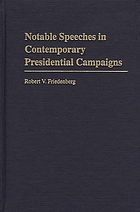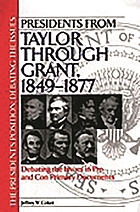 Go to A-Z Databases: Books & eBooks to search for more eBooks. Must be on campus or login with your COM account for off campus access.
Go to A-Z Databases: Books & eBooks to search for more eBooks. Must be on campus or login with your COM account for off campus access.
Want more on finding books or eBooks? Try our How to Use Books & eBooks guides.
 Televised Presidential Debates in a Changing Media Environment [2 Volumes]
This two-volume set examines recent presidential and vice presidential debates, addresses how citizens make sense of these events in new media, and considers whether the evolution of these forms of consumption is healthy for future presidential campaigns--and for democracy. Examines research on presidential debates from 2004 to 2016, and considers how these debates--and elections--were affected by the changing media environment of each election season; Assesses the impact of U.S. citizens using social media to make sense of the campaign debates; Considers whether the established presidential debate format is no longer effective for informing voters in a time of unprecedented political polarization and voter cynicism; Applies different methods of analyzing the debates that will interest rhetorical scholars, argumentation scholars, and political communication scholars.
Televised Presidential Debates in a Changing Media Environment [2 Volumes]
This two-volume set examines recent presidential and vice presidential debates, addresses how citizens make sense of these events in new media, and considers whether the evolution of these forms of consumption is healthy for future presidential campaigns--and for democracy. Examines research on presidential debates from 2004 to 2016, and considers how these debates--and elections--were affected by the changing media environment of each election season; Assesses the impact of U.S. citizens using social media to make sense of the campaign debates; Considers whether the established presidential debate format is no longer effective for informing voters in a time of unprecedented political polarization and voter cynicism; Applies different methods of analyzing the debates that will interest rhetorical scholars, argumentation scholars, and political communication scholars.
![]()
Go to OneSearch to search for more print books.
Want more on finding print books? Try our How to Use OneSearch guide.
 COM Library has some great collections of primary sources. Primary sources are records created at the time of an event or experience, or as told by people who were present at the event. Must be on campus or login with your COM account for off campus access.
COM Library has some great collections of primary sources. Primary sources are records created at the time of an event or experience, or as told by people who were present at the event. Must be on campus or login with your COM account for off campus access.
Want more on finding primary sources? Try Tips for Finding Primary Sources or Tips for Finding Primary Sources Open Access.
 Notable Speeches in Contemporary Presidential Campaigns
Though many studies of contemporary campaigns focus on brief political advertisements and the growing impact of technology on contemporary campaigns, the definitive statements of most candidates are still made in public addresses. Friedenberg examines the first public address made by an American presidential candidate on his own behalf. The circumstances giving rise to William Henry Harrison's 1840 address, and the themes that he developed in that address are strikingly contemporary, serving as an appropriate prelude to the examinations of contemporary political speaking that follow. Those examinations focus on notable campaign speeches by John F. Kennedy, Barry Goldwater, Richard Nixon, Ronald Reagan, Bill and Hillary Clinton, and George W. Bush.
Notable Speeches in Contemporary Presidential Campaigns
Though many studies of contemporary campaigns focus on brief political advertisements and the growing impact of technology on contemporary campaigns, the definitive statements of most candidates are still made in public addresses. Friedenberg examines the first public address made by an American presidential candidate on his own behalf. The circumstances giving rise to William Henry Harrison's 1840 address, and the themes that he developed in that address are strikingly contemporary, serving as an appropriate prelude to the examinations of contemporary political speaking that follow. Those examinations focus on notable campaign speeches by John F. Kennedy, Barry Goldwater, Richard Nixon, Ronald Reagan, Bill and Hillary Clinton, and George W. Bush.
 Presidents from Taylor Through Grant, 1849-1877 : Debating the Issues in Pro and Con Primary Documents
The years 1849-1877 were among the most pivotal in the nation's history. Over the course of three decades, the United States endured a catastrophic civil war, abolished slavery, expanded westward and added eight states to the Union, and witnessed the beginnings of industrialization. In politics, the era saw the demise of one national party, the birth of another, and the historic leadership of Abraham Lincoln. The country also faced difficult questions of state sovereignty and federal responsibility answered ultimately by secession and war. In short, it was a time of growth, consolidation, tragedy, and triumph for a dynamic and youthful nation. This resource of primary documents and commentary covers the Taylor through Grant administrations by selecting and describing five to ten of the foremost issues of the day and showing the actual text of the president's position along with the opposing viewpoint. The presidents from 1849-1877 were men of varied backgrounds and talents. Northerners and Southerners and even Northerners with Southern sensibilities occupied the White House. The period began and ended with war heroes as presidents; among the other men who served as president were a former textile worker, a country lawyer, and lifelong diplomat. Most of the chief executives struggled and perhaps even failed to overcome the immense challenges placed before them. By providing helpful background information and commentary about the presidents and the issues of the day in addition to the primary sources, this reference guide accurately depicts this fractious time in the country's past and provides an invaluable resources to any student of American history.
Presidents from Taylor Through Grant, 1849-1877 : Debating the Issues in Pro and Con Primary Documents
The years 1849-1877 were among the most pivotal in the nation's history. Over the course of three decades, the United States endured a catastrophic civil war, abolished slavery, expanded westward and added eight states to the Union, and witnessed the beginnings of industrialization. In politics, the era saw the demise of one national party, the birth of another, and the historic leadership of Abraham Lincoln. The country also faced difficult questions of state sovereignty and federal responsibility answered ultimately by secession and war. In short, it was a time of growth, consolidation, tragedy, and triumph for a dynamic and youthful nation. This resource of primary documents and commentary covers the Taylor through Grant administrations by selecting and describing five to ten of the foremost issues of the day and showing the actual text of the president's position along with the opposing viewpoint. The presidents from 1849-1877 were men of varied backgrounds and talents. Northerners and Southerners and even Northerners with Southern sensibilities occupied the White House. The period began and ended with war heroes as presidents; among the other men who served as president were a former textile worker, a country lawyer, and lifelong diplomat. Most of the chief executives struggled and perhaps even failed to overcome the immense challenges placed before them. By providing helpful background information and commentary about the presidents and the issues of the day in addition to the primary sources, this reference guide accurately depicts this fractious time in the country's past and provides an invaluable resources to any student of American history.
© 2024 COM Library
1200 Amburn Road, Texas City, Texas 77591
409-933-8448 . FAX 409-933-8030
This work is licensed under a Creative Commons Attribution-NonCommercial 4.0 International License